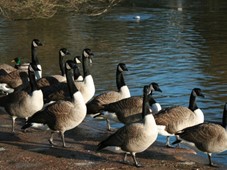
Species extinctions are occurring at an alarming rate, with the introduction of non-native species being a leading threat. Monitoring is crucial in understanding the scale of the threat and informing management actions. Members of the public across Belgium are helping combat invasive species through both submitting ad hoc records and helping with systematic invasive counts.
Five hundred alien species have demonstrated negative biodiversity impacts across the globe, with this number likely an underestimate (McGeoch et al. 2010). Over 30% of extant birds are currently threatened by invasive species (BirdLife International 2013) and half of the planets recent bird extinctions have been linked with alien non-natives (BirdLife International 2008). This is of concern since the number of invasive species in Europe has increased 76% since 1970 (Butchart et al. 2010).
Monitoring is crucial in understanding the scale of the threat and limiting the impact of invasive species on native flora and fauna. To this end, the BirdLife Invasive Alien Species Programme and Natuurpunt’s (BirdLife in Flanders, Belgium) have created an online early warning system, whereby volunteers can report the sighting of invasive species with a photo and exact location. Environmental NGOs, governments or private land owners can subscribe to get an email when observations of Red and Black List Invasive Alien Species are reported. This system has been running since 2012, and utilises citizen scientists to locate non-native species quickly across a large geographic area.
The system has already helped with an eradication programme for Ruddy Duck Oxyura jamaicensis and is also being used in controlling exotic goose species. A network of over 10,000 observers assist in collecting data on both exotic and native geese species, where counts are made at major sites to create a dataset that is analysed by the Flemish government (INBO) to inform eradication efforts.
Related Case Studies in other sections
Related Species
References
Compiled: 2015 Copyright: 2015
Recommended Citation:
BirdLife International (2015)
Citizen scientists help track invasive species in Belgium.
Downloaded from https://datazone.birdlife.org/sowb/casestudy/citizen-scientists-help-track-invasive-species-in-belgium on 22/12/2024